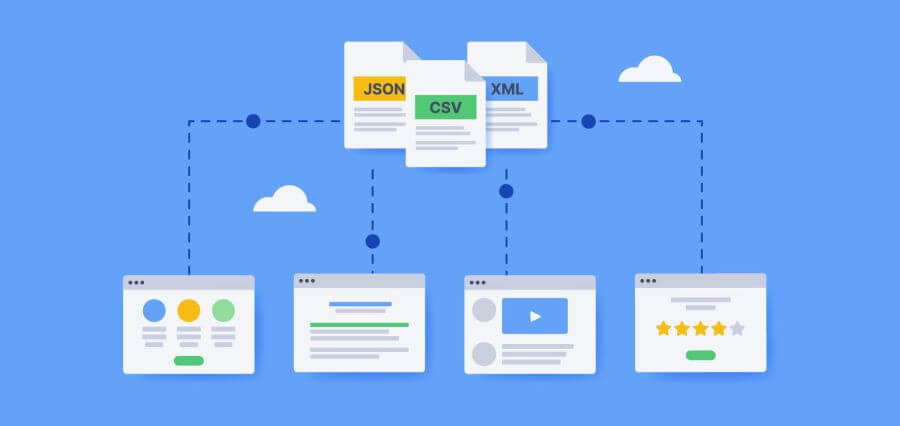Everyone in today’s competitive world seeks new ways to develop and exploit new technologies. Web scraping, sometimes called data scraping or web data extraction, is an automated procedure that extracts data from a website and exports it in a structured format.
Read on to find out what exactly web scraping is and why companies use static residential proxies to enhance their web scraping capabilities.
What is web scraping?
Web scraping is extracting web data into a more usable format for the user. For instance, you could scrape product information from an eCommerce website and save it to an excel spreadsheet. Among the many web scraping applications are pricing monitoring, news monitoring, lead generation, and market research.
Overall, web scraping is utilized by individuals and enterprises who seek to produce important insights and make better decisions by leveraging publicly available web data.
While web scraping can be performed manually, an automated solution is preferable in most circumstances. After all, these are frequently faster and less expensive than manually scraping data.
Web scraping can be a complex and delicate task, and there are several methods to perform it without resorting to bypassing security measures. One approach is to obtain permission from the website owner or administrator and follow any guidelines or restrictions they may have. Even then, you may run into issues as part of your day to day scraping activities, because in the search for actionable data, all sorts of obstacles stand in your way – often as a result of cybersecurity measures rather than anti-scraping tactics, which makes the implementation of a Python Cloudflare bypass something to consider. So why is this an issue? Cloudflare has the ability to restrict access to its content, hence there may be a need for Cloudflare bypass.
Why is it necessary to use static residential proxies for web scraping?
Previously, when you wanted to scrape a website, you would go online, pick a proxy service, and get data center proxies to use with your web scraper, and everything would be OK. The data would be returned, and you could obtain the data in the format you needed.
Nowadays, online scraping is more complex than it once was. Websites and anti-scraping technology have advanced to the point where they can detect and block suspicious requests from web scrapers.
This has culminated in an upsurge in demand for residential proxies. This proxy shifts the power imbalance back in favor of the web scraper and renders it far more challenging for websites to prevent you from accessing public data on their site.
Residential proxies – a quick explanation
Residential proxies send traffic through a home or workplace internet router rather than a data center. This makes it appear that the request comes from someone’s home or a nearby business.
While residential proxies are frequently compared to their data center counterparts, this proxy type differs from data center proxies in that the underlying IP address is owned by an ISP and assigned to a specific device, such as a desktop or mobile.
Static residential proxies provide users a fixed IP address rather than rotating residential proxies. In the context of web scraping, the IP address will remain unchanged with each new request.
What are the benefits of static residential proxies for companies?
There are several reasons why static residential proxies are the best choice for businesses. The most important reason to choose residential proxies over data center proxies is if your data center proxies are constantly being blocked by the website you are attempting to scrape.
When it comes to web scraping, companies are increasingly deploying sophisticated anti-scraping solutions to detect and prevent users from scraping their websites. These anti-scraping tools see and block requests from specific IP addresses using a variety of request and behavior profiling approaches.
The benefit of residential proxies is that it makes it considerably more difficult for anti-scraping systems to establish whether a request is from a scraper or an ordinary user. When compared to data center proxies, success rates are often substantially greater.
What can businesses gain from web scraping?
SEO Monitoring
As search engine optimization (SEO) is all about data, monitoring is essential to this activity. It is the continuous gathering of information on the online presence of a website on search engines. The clearer the data, the more possible solutions to enhance website traffic will be recognized.
Proxies are essential for this activity, and most SEO or marketing programs employ them somehow. Residential IP addresses are particularly useful due to their precise geolocation and potential to browse competitor websites anonymously.
Lead Generation
In summary, many businesses utilize web scraping to obtain contact information from potential consumers or clients. This is frequent in the business-to-business market, as potential clients publicly display their company details online.
Social Media Analysis
If you ever tweeted during a major TV program, your tweet may have been scraped and examined by the show’s network for them to understand how their performance is being received on social media.
Numerous social media platforms can be scraped to conduct more in-depth sentiment analysis on specific subjects. This is useful not only for multiple businesses but also for individuals such as legislators. Businesses can leverage this data to understand better how their efforts are perceived on social media.
Conclusion
Residential proxies have proven to be a beneficial resource for online enterprises. Due to their anonymity and security, business owners and teams can obtain accurate and timely data to make educated choices regarding their business objectives. Streamlining your web scraping activities with static residential proxies is the best way to stay ahead of the curve.


